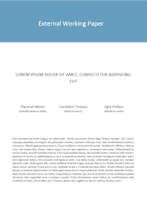This research uses variation in the scope of banking activities as a shock to banks’ private-information acquisition to carve out the real effects of (bank) creditors’ informedness about their borrowers.
Theoretically, lender informedness implies reduced informational asymmetries between lenders and borrowers, allowing for more flexible loan contracting. The research supported by the Keynes Fund grant shows empirically that increased lender informedness has implications for (i) contracting among banks in loan syndicates and for (ii) the disclosure of innovation-related activities (in the form of patenting) by credit-financed firms. In particular, banks’ private-information acquisition in lending relationships and firms’ public-information production through patents are shown to be substitutes.
Does Bank Scope Improve Monitoring Incentives in Syndicated Lending?
Does Bank Scope Improve Monitoring Incentives in Syndicated Lending?, Daniel Neuhann and Farzad Saidi (2016)
We propose a model to study the provision of monitoring incentives in loan syndicates when banks differ in scope. Because bank scope increases a bank's total exposure to firm performance beyond its loan share, banks of wide scope have incentives to monitor the firm even when they receive small loan shares. As such, they are more likely to be chosen as lead arrangers, yet receive comparatively small lead shares. We confirm these predictions empirically by exploiting the repeal of the Glass-Steagall Act. Our findings suggest that the observed increases in syndicated-loan volumes and simultaneous decreases in lead shares over the last two decades are not associated with losses in monitoring efficiency.
Patents as Substitutes for Relationships
Patents as Substitutes for Relationships, Farzad Saidi and Alminas Žaldokas, 2016
Firms face a trade-off between patenting, thereby disclosing innovation, and secrecy. In this paper, we show that this trade-off extends to financing relationships. We exploit the American Inventor's Protection Act of 1999, which forced firms to disclose the content of their patent applications within 18 months after filing for them. Firms in industries that experienced a greater change in the publicity of their patent applications were significantly more likely to break up their previous banking relationships and switch lenders. In addition, we explore whether deeper banking relationships tip the trade-off in favor of secrecy by increasing the value of private information. Consistent with this conjecture, we find that increased lender informedness following the creation of universal banks leads to fewer patents issued by publicly listed U.S. firms, without affecting investment in innovation and its outcomes, such as new-product announcements.


